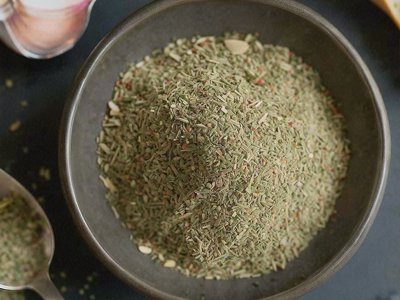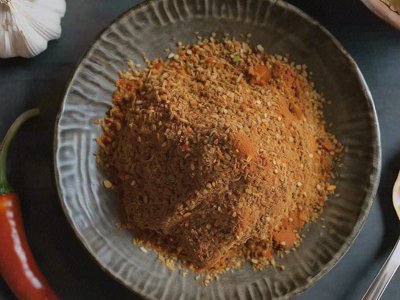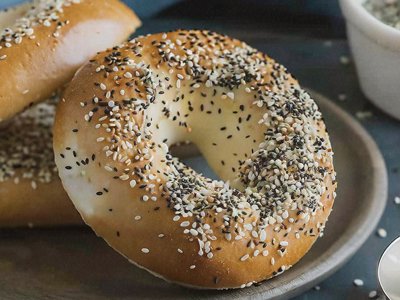Harissa
Harissa is the fiery soul of North African cuisine, a complex chili paste that brings both heat and depth to dishes. While it's often thought of as simply hot, true harissa is about balance - the heat of chilies tempered by warm spices and the umami richness of garlic.
The Blend
Chili Base:
- 8-10 dried red chilies (preferably guajillo or ancho for depth, with some hotter varieties)
- 2-3 fresh red chilies (for brightness and immediate heat)
- 1 tablespoon chili flakes (adjust based on desired heat level)
Spice Foundation:
- 2 tablespoons ground cumin (provides warm, earthy base)
- 1 tablespoon ground coriander (adds citrus brightness)
- 1 tablespoon ground caraway (distinctive anise-like notes)
- 1 teaspoon ground paprika (adds color and mild sweetness)
Aromatic Elements:
- 6-8 cloves garlic (roasted for sweetness, raw for pungency)
- 1 teaspoon ground black pepper (enhances other spices)
- 1/2 teaspoon ground cinnamon (subtle sweetness)
Liquid and Texture:
- 1/4 cup olive oil (for smoothness and preservation)
- 1 tablespoon lemon juice (brightens the blend)
- 1 teaspoon sea salt (enhances all flavors)
Chili Selection Strategy
The key to great harissa is using multiple types of chilies. Guajillo chilies provide deep, smoky flavor; ancho chilies add sweetness; and hotter varieties like arbol or cayenne bring the heat. The ratio should be about 70% mild chilies for flavor and 30% hot chilies for heat.
Dried chilies should be soaked in hot water for 20-30 minutes to rehydrate, then drained and patted dry. This makes them easier to process and brings out their full flavor.
The Roasting Technique
Roasting the garlic mellows its sharpness and adds sweetness. Wrap unpeeled garlic cloves in foil and roast at 400°F for 20-25 minutes until soft and golden. Let cool, then squeeze out the soft cloves.
For a more traditional approach, you can also char the chilies over an open flame or under the broiler to add smoky depth.
Processing Methods
Traditional: Use a mortar and pestle for the most authentic texture and flavor development Modern: Food processor for convenience, but pulse carefully to avoid over-processing Hybrid: Grind spices in mortar and pestle, then combine with processed chilies
The final texture should be coarse but spreadable - not completely smooth like commercial harissa.
Storage and Preservation
Store in an airtight container in the refrigerator. The olive oil helps preserve the harissa, but it's best used within 2-3 weeks for optimal flavor. For longer storage, freeze in ice cube trays and thaw as needed.
Traditional Applications
Couscous: The classic use - adds heat and depth to steamed couscous Tagines: Stir into slow-cooked meat and vegetable stews Grilled Meats: Use as a marinade or finishing sauce Eggs: Add to shakshuka or scrambled eggs
Modern Uses
Sandwiches: Spread on bread for instant heat and flavor Pasta: Stir into pasta dishes for North African flair Pizza: Use as a base sauce for spicy pizzas Dips: Mix with yogurt or mayonnaise for creamy heat
Heat Variations
Mild Harissa: Use mostly guajillo and ancho chilies, minimal hot chilies Medium Harissa: Balance of mild and hot chilies (recommended for most uses) Hot Harissa: Increase proportion of hot chilies, add cayenne powder Smoky Harissa: Char the chilies and add smoked paprika
Regional Styles
Tunisian Harissa: Often includes rose petals and is typically the hottest Moroccan Harissa: Usually milder, with more emphasis on spices than heat Algerian Harissa: May include preserved lemon for additional brightness Libyan Harissa: Often includes more garlic and sometimes mint
Pairing Considerations
Harissa works beautifully with:
- Olive oil (the traditional base)
- Lemon juice (brightens the heat)
- Yogurt (creates creamy, cooling sauces)
- Fresh herbs like cilantro and parsley
- Sweet ingredients like honey or dates (for balance)
This fiery paste embodies the bold spirit of North African cooking - unapologetically spicy, deeply flavorful, and impossible to ignore.



